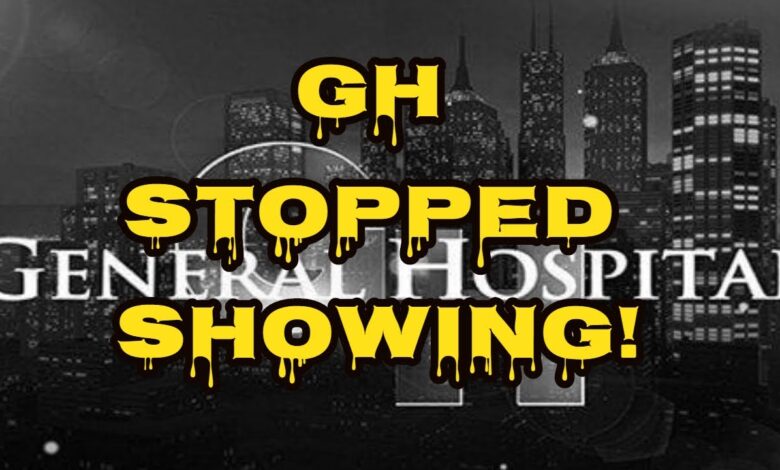HOT NEWS! GH Canceled On Hulu And ABC’s Website! General Hospital Spoilers

General Hospital Spoilers: The Night Port Charles Went Dark – What the Blackout Means for the Soap’s Future
On Tuesday, September 30th, a strange kind of silence settled over living rooms across America. Loyal General Hospital fans sat down for their daily ritual, the familiar hour of tangled loyalties, betrayals, heartbreak, and revelations, only to find themselves staring into nothingness. Instead of Port Charles and its endlessly twisting stories, screens filled with buffering circles, blank slates, and unexpected silence.

There was no preemptive notice, no press release, no scrolling ticker across the bottom of the screen. Just absence.
It was the kind of interruption that felt different—not a storm cutting power, not a local glitch on a single affiliate, but a coordinated void that spread across time zones, networks, and streaming services. Hulu subscribers, ABC site visitors, cable viewers—none of them found their scheduled escape to Port Charles. For a show that has been an anchor in daytime since 1963, the blackout was jarring, unnerving, and deeply symbolic.
From Confusion to Panic
The first wave was disbelief. Viewers hit their remotes with frantic repetition, double-checked DVRs, and refreshed Hulu, thinking perhaps the problem was their own connection. But soon the confusion gave way to a more collective realization—this wasn’t personal; it was everywhere.
Social media lit up within minutes, hashtags surging with fragments of questions:
-
“Anyone else’s General Hospital missing?”
-
“Did my DVR mess up or is this real?”
-
“ABC, what are you doing?!”
Older fans reportedly called affiliates directly, flooding local newsrooms with concerns. One woman in Ohio texted her granddaughter three times in an hour to confirm she hadn’t imagined it. In New York, a barista who watches the show on break posted a plea for updates. The community of General Hospital—spanning decades, generations, and states—was thrown into a rare collective silence.
Nathan Vanney Speaks
Only later in the evening did answers begin to surface. Producer Nathan Vanney, long regarded as the voice of steadiness when disruptions struck, finally issued a statement. His tone was a balancing act—urgent but measured, factual but careful.
The explanation: General Hospital had been preempted nationwide for the Major League Baseball Wild Card broadcast.
The blunt words that followed carried a heavier punch than usual: “The entire show was being cancelled for that night across every time zone.”
That phrasing—cancelled, every time zone—felt seismic. Sports interruptions are not new to daytime soaps, but the scope and absolute clarity of the announcement sparked deeper fears. And then came the bigger blow: Wednesday, October 1st, would follow the same fate. No new General Hospital. Another blank square in the calendar.
Vanney cautiously floated the possibility—though he emphasized it was only a possibility—that new episodes could return Thursday, October 2nd, or Friday, October 3rd. Failing that, the next target date would be Monday, October 6th.
The tentative nature of these assurances rattled fans even more.
Why This Felt Different
Sports have always had a gravitational pull in television. Live games offer unpredictability, massive audiences, and premium advertising revenue. For a network like ABC, choosing a playoff game over a soap is simple business arithmetic.
But this blackout wasn’t confined to linear broadcast. Hulu and ABC’s own streaming platforms also pulled the episode—a move that struck a deeper nerve. Streaming had long been the “safety net” for fans, the sanctuary where episodes lived on demand regardless of sports, breaking news, or time zone. To see those archives replaced with cold, professional slates announcing “Nothing Available” felt like betrayal.
This detail hinted at a centralized decision, not just a routine scheduling shuffle. Theories multiplied online:
-
Was this about contract negotiations between ABC and advertisers?
-
Were streaming rights being quietly renegotiated?
-
Could this be a stress test of fan loyalty ahead of bigger changes?
Fans on Edge
For soap opera devotees, history casts a long shadow. Too many shows—All My Children, One Life to Live, Guiding Light, As the World Turns—had vanished with little warning. Some wrapped in haste, some ended quietly, but all left scars.
The blackout immediately triggered that collective memory. Was General Hospital, the last titan of daytime drama still standing strong, about to join them?
Online forums quickly filled with dual camps:
-
The Doomsayers feared cancellation was imminent. They imagined rushed endings, dangling storylines tied up too quickly, and Port Charles fading into memory.
-
The Hopefuls saw this as turbulence, nothing more. They pointed to ongoing production—sets still active, scripts still written, actors still filming—as proof the show remained alive.
Inside the Studio
While fans panicked, the machine of production continued to churn. Makeup chairs still bore the imprint of actors. Cameras still rolled. Writers still adjusted scripts to fit uncertain air dates. A director juggled shot lists with contingency calendars, bracing for episodes that might air out of sequence.
For the people inside the studio, this was another storm to weather. The decision to pull the broadcast may have been a knife, but the heart of General Hospital was still beating backstage.
What’s at Stake
The implications extend beyond schedules. General Hospital is not just a show—it is history. Since 1963, it has shaped daytime television, launched careers, and provided cultural touchstones. To end it would not be like canceling a struggling sitcom; it would mean shuttering an institution.
Executives know this. Which is why many fans believe the blackout is not a death knell, but a temporary diversion. Perhaps even a test—an opportunity to measure how fiercely viewers will fight for their soap. Judging by the trending hashtags, petitions, and letter-writing campaigns already underway, the loyalty remains fierce.
Two Possible Futures
As the blackout days tick by, speculation continues to split into two visions:
-
The Ending Scenario
General Hospital bows out, perhaps sooner than expected. If this were the case, fans believe ABC would stage a grand finale—bringing back legacy characters, resolving decade-old arcs, and paying tribute to its cultural significance. It would be mourned but remembered. -
The Resilient Scenario
The blackout proves temporary. The show returns, perhaps with double episodes or delayed cliffhangers, ultimately surviving as it has through countless storms. In this version, September 30th becomes a curious footnote in its long legacy, a night when Port Charles briefly went dark but roared back stronger.
The Present Cliffhanger
For now, General Hospital itself has become a soap opera cliffhanger. Fans wait for official confirmation of the next broadcast date, refreshing pages, checking guides, and holding onto the hope that Thursday, Friday, or at worst, Monday will restore their ritual.
The story remains suspended—just like the countless plotlines it interrupted: confessions half-spoken, reunions nearly reached, betrayals waiting to explode.
And that may be the most poetic twist of all. In soap operas, suspense is the lifeblood. On September 30th, the suspense slipped out of the fictional world of Port Charles and into reality itself.
Whether this blackout proves to be the beginning of the end or simply a dramatic pause, one thing is certain: General Hospital’s legacy is already secure. Its stories live not only on screen but in the memories, hearts, and routines of the millions who continue to wait, and hope, for the next beat.




